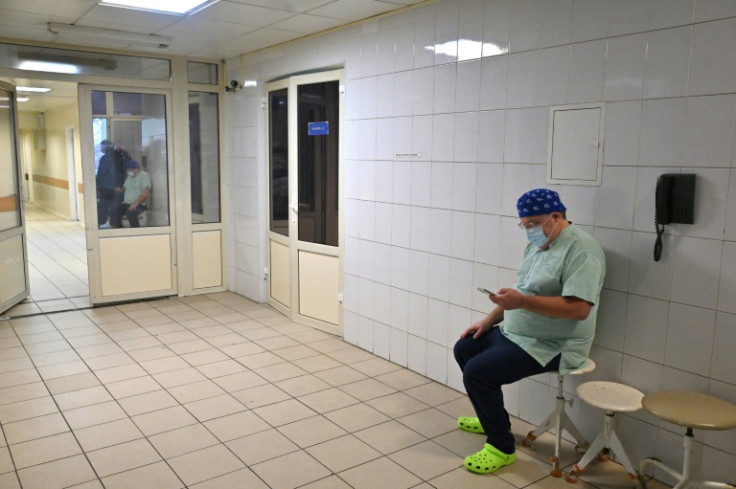
Andrei Volna had long started losing faith in his homeland before Russian tanks entered Ukraine.
That was when the Russian surgeon's disillusionment passed the point of no return and he decided to flee.
Waiting in a line of cars at the border with Estonia, the 61-year-old left behind a comfortable life in Moscow -- with his wife and three children in tow -- determined to use his medical skills to help Ukrainians.
"It's a moral, ethical choice, above all. We want as much as possible to do our part to make Ukraine win more quickly," the orthopaedic surgeon told AFP in a military hospital in Kyiv.
"And we will stop living this war only when the war ends on Ukraine's terms," the bespectacled, grey-haired doctor in blue scrubs said.
President Vladimir Putin's invasion of Ukraine in February 2022 sparked an exodus from the country of Russians fearing repression and then, later, conscription.
A handful like Volna, who traces his family roots to Ukraine, have ended up fighting against Russian forces on the front line or aiding Kyiv's war effort however they can.
Volna first arrived in Kyiv last September after securing residency in EU and NATO state Estonia, and then permission to volunteer in Kyiv.
He teared up as he recounted witnessing a military funeral procession hours after crossing the border, realising his country "killed that young guy".
And that night, air raid sirens echoed over Kyiv during a Russian missile barrage. Volna likened the thundering blasts and flashes through the windows to a "devil's disco".
"Since my first night in Kyiv, I understood what this war is here. The Russians showed me," he told AFP.
His life back home reflected the political upheavals that culminated in the invasion, and his opposition to the Kremlin began long before the war.
He said he was pressured into leaving a job at a clinic in 2016 for speaking out publicly against Russia's annexation of Crimea two years earlier.
He later helped allies of Alexei Navalny establish that the opposition leader was poisoned with Novichok nerve agent in 2020, although he does not count himself among Navalny's supporters.
When Navalny began a hunger strike after being detained on old fraud charges, Volna joined a chorus of medical professionals concerned for his health.
His decision to ultimately leave Moscow was spurred by tips from patients linked to the judiciary and security services that the authorities were preparing a case against him under new laws banning criticism of the war.
Now in Kyiv, he mainly treats soldiers with fractures from massive blasts -- injuries that recall his early career in the Siberian region of Kemerovo where many of his patients were miners injured by gas explosions underground.
He mused over whether that experience was part of a higher power's plan "so that during this war I could support my Ukrainian colleagues and my Ukrainian patients. I don't know."
Volna's vocal political stance and respect among peers has helped him win the confidence of his patients, despite his nationality.
A 35-year-old Ukrainian soldier called Mykola, whose leg was torn up during Russia's devastating siege of the port city of Mariupol, said he had faith both in Volna's loyalties and expertise.
"If I didn't trust him, I wouldn't be here," Mykola told AFP, lying in a stale ward smelling of industrial cleaner, with other wounded servicemen missing limbs.
Petro Nikitin, the head of the trauma department, has been friends with Volna for over a decade and helped him get permission to work in Ukraine after war broke out.
"The first time he came in, he went straight to the operating room," Nikitin, 61, told AFP.
Volna said he is bewildered by the Russian president's decision to unleash the destructive conflict, whose victims he is now trying to save.
"I don't understand Putin. He has absolutely no empathy," the surgeon said.
But he said Russians were collectively responsible for their failure to stop the former KGB agent on his march to war, a burden he said he would carry "for the rest of my life".
"I lived in Russia for 59 years. I did everything I could for Russia," he said.
"I thought about a European path for Russia but Russia decided to take a fascist path. It's not for me. It's not for my family."




